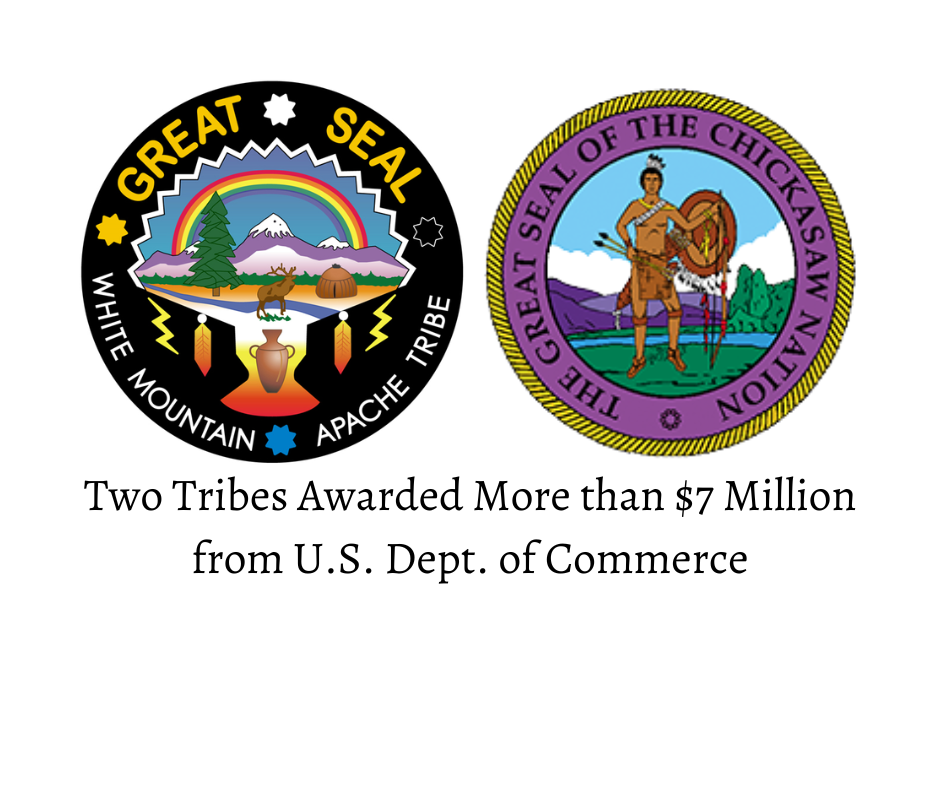
- Details
- By Native News Online Staff
WASHINGTON — The Chickasaw Nation of Oklahoma and the Fort Apache Indian Reservation in Arizona have been awarded $7.8 million in funding from The U.S. Department of Commerce’s Economic Development Administration (EDA).
Both grants are part of the American Rescue Plan's Indigenous Communities program and will be used for local business growth.
The Chickasaw Nation was awarded a $3.1 million grant to build a critical high-speed network while promoting entrepreneurship and workforce development to the Tribal community in Ada, Oklahoma. The project was organized by the Southern Oklahoma Development Association (SODA) and is focused on creating an economic roadmap to strengthen the regional economy and create jobs.
“This EDA investment will provide the high-speed internet capacity that Chickasaw Nation businesses need to grow and thrive,” Assistant Secretary of Commerce for Economic Development Alejandra Y. Castillo said in a statement on Tuesday.
The Fort Apache Heritage Foundation, Inc., was awarded a $4.7 million grant to build new commercial infrastructure for Tribal entrepreneurs as they start and grow businesses on reservation land. According to the EDA, the grant will be matched with $406,855 in local funds and is expected to create or retain 190 jobs, according to estimates. The project will help the renovation of an existing residential building for use as office and commercial space.
“This EDA investment will provide critical infrastructure for the White Mountain Apache Tribe of the Fort Apache Reservation, supporting the diversification of the economy and the creation of new jobs in the community,” Secretary of Commerce Gina Raimondo said in a statement.
The Fort Apache Indian Reservation is in northeastern Arizona and spans parts of Navajo, Gila, and Apache counties. It is home to the federally recognized White Mountain Apache Tribe of the Fort Apache Reservation, a Western Apache tribe.
“We’re proud to help secure over $4 million for Fort Apache Indian Reservation small businesses,” Senator Krysten Sinema (D-AZ) said in a statement. “This historic investment will fuel growth and create more economic opportunities, helping Arizonans continue to thrive.”
$100 million of American Rescue Plan funding has been allocated specifically for Indigenous communities and Tribal Governments, who were disproportionately impacted by the coronavirus pandemic. The program funds a wide range of technical, planning, workforce development, entrepreneurship, and public works and infrastructure projects. The program closed applications on May 26, 2022, with program funding to be announced through September 30, 2022.
More Stories Like This
Native News Weekly (August 25, 2024): D.C. BriefsUS Presidents in Their Own Words Concerning American Indians
Indigenous Actor Elaine Miles Reports Detention by Alleged ICE Agents
Happy Thanksgiving from Native News Online
Coming Up on Native Bidaské: Behind the Animation: Joey Clift Talks “Pow” and Native Storytelling
Help us tell the stories that could save Native languages and food traditions
At a critical moment for Indian Country, Native News Online is embarking on our most ambitious reporting project yet: "Cultivating Culture," a three-year investigation into two forces shaping Native community survival—food sovereignty and language revitalization.
The devastating impact of COVID-19 accelerated the loss of Native elders and with them, irreplaceable cultural knowledge. Yet across tribal communities, innovative leaders are fighting back, reclaiming traditional food systems and breathing new life into Native languages. These aren't just cultural preservation efforts—they're powerful pathways to community health, healing, and resilience.
Our dedicated reporting team will spend three years documenting these stories through on-the-ground reporting in 18 tribal communities, producing over 200 in-depth stories, 18 podcast episodes, and multimedia content that amplifies Indigenous voices. We'll show policymakers, funders, and allies how cultural restoration directly impacts physical and mental wellness while celebrating successful models of sovereignty and self-determination.
This isn't corporate media parachuting into Indian Country for a quick story. This is sustained, relationship-based journalism by Native reporters who understand these communities. It's "Warrior Journalism"—fearless reporting that serves the 5.5 million readers who depend on us for news that mainstream media often ignores.
We need your help right now. While we've secured partial funding, we're still $450,000 short of our three-year budget. Our immediate goal is $25,000 this month to keep this critical work moving forward—funding reporter salaries, travel to remote communities, photography, and the deep reporting these stories deserve.
Every dollar directly supports Indigenous journalists telling Indigenous stories. Whether it's $5 or $50, your contribution ensures these vital narratives of resilience, innovation, and hope don't disappear into silence.
 The stakes couldn't be higher. Native languages are being lost at an alarming rate. Food insecurity plagues many tribal communities. But solutions are emerging, and these stories need to be told.
The stakes couldn't be higher. Native languages are being lost at an alarming rate. Food insecurity plagues many tribal communities. But solutions are emerging, and these stories need to be told.
Support independent Native journalism. Fund the stories that matter.
Levi Rickert (Potawatomi), Editor & Publisher

